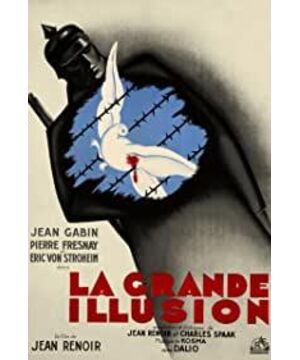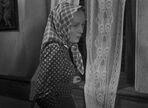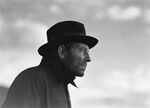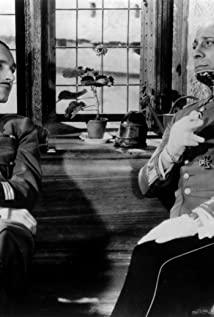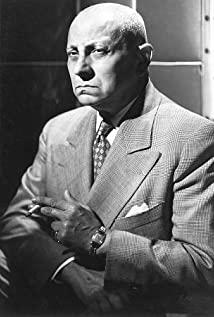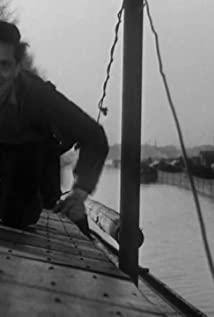Like many movies that have a place in world film history, "The Great Disillusionment" has long and poetic long shots, concise and thought-provoking dialogues, unique camera movements, and in-depth discussions on war and human nature. . It is a recognized great film. Many aspects of the film can become film teaching materials. However, I personally think that the commendable long shots and depth-of-field shots are wonderful, and the director's intentional simplification and omission in the film narrative are also amazing. The record player first appeared in the film, and the camera slowly rose amidst the melodious music. Lieutenant Mike listening to the music appeared, and a group of card players existed as a blurred background. The scenes were switched several times, and after a few conversations, the audience understood that Mike was about to conduct aerial reconnaissance. The camera changes, a group of Germans celebrated their dedication and drank alcohol. During chat, they learned that there might be surviving French officers on the crashed plane. Mike was brought up as a captive and received an unexpectedly friendly reception. Just a few shots and a few sentences of dialogue omitted a possible small-scale war. I did not see the wreckage of the plane and the dripping blood, but the general development of the story can be imagined in the only words given by the director. It is a group of people who have escaped from prison many times, and Laufens's interrogation of several people confirmed this fact. Of course, the guy who caused the German headaches, probably changed prison many times, and finally transferred to the castle managed by Laufens. It is a building of a certain age. It has existed before the end of the Middle Ages. A building with a sense of age will not cause the residents to recall the history and the past-there are no poets and romantics in the prison. What most prisoners of war saw was the monotony of life and the slim chance of escape. Before a few people arrived at the castle, there was a fast-moving panning shot, and the nearby scenery flashed away, and only things in the depth of field could be kept in the shot for a short period of time. There is no doubt that the camera is simulating the viewpoint of a person in a high-speed moving vehicle. After the lens fades out, it fades in. It is a brand-new landscape, and at the same time a constant panning lens. Needless to say, the constantly switching panning shots show the characters moving in different places. It’s a scene that seems inexplicable, but after seeing the conversation between Laufens and the jailbreak trio-this name may not be rigorous but very appropriate-did I know how much this panning shot has omitted and it takes a lot of effort. Plot. The unspeakable but dispensable plot was briefly introduced, and then a long mirror was used to pave the way for Laufens's appearance. The crucified Jesus, the portrait of the German emperor, the white and meticulous sheets, the gloves carefully arranged by the servants, and finally the camera follows the one holding the coffee cup The hand moved slowly, at this time the deity appeared. After the omission of the long mirror is always particularly eye-catching, Laufens' appearance is also extraordinary. To add a digression, you must know that when Renoir was asked to make this film, the French New Wave had not yet appeared, and the exploration and theories about the skipping of the narrative and the seemingly inactive long shots have not yet appeared. It seems unfair to say that there are no poets and romantics in prison, at least it is unfair to Laufens. Compared with the Russians who burned books, Laufens, who pays attention to noble etiquette and caring for geraniums, undoubtedly has a little gentlemanly demeanor and romantic spirit. But when he shot the captive Captain Bodio, who was also a nobleman, all the romantic imagination disappeared. "On the outside, children play soldiers; on the inside, soldiers play children." In addition to the absurdity of the captain's tone, war is more cruel. It is too extravagant to cherish each other and appreciate each other. Perhaps the more cruelty of the war is reflected in the two people who successfully escaped from prison. Mike and the woman who doesn't speak the language but loves each other can't stay together, and they don't have a clue about the long road ahead and future plans. When her companion informed them that they were leaving, the woman calmly accepted all this. It is undoubtedly hard to bear to be separated from the one you love, but this is a war, and family members go to the battlefield one by one, and have probably learned to remain indifferent in the face of life and death in the sufferings of time after time. The companion opened the window, and the image of Mike appeared in the window frame. The figures in the picture frame look so helpless. The depth-of-field lens reflects the cruelty of war and the personal weakness and powerlessness in the face of war. At the end, the two entering Switzerland without knowing it After escaping a death, the German soldiers’ dialogue sounds bad but gentle; “They are in Switzerland,” “I think they are lucky.” But are the two Mikes really lucky? The camera left the soldier and turned to the two people crawling in the snow, with the boundless white snow in front and the "boundary of people" behind them. In a "great phantom" constructed by omissions and long shots, individuals can escape from prison, but they can never escape the war. , Laufens, who pays attention to aristocratic etiquette and caring for geraniums, undoubtedly has such a gentlemanly demeanor and romantic spirit. But when he shot the captive Captain Bodio, who was also a nobleman, all the romantic imagination disappeared. "On the outside, children play soldiers; on the inside, soldiers play children." In addition to the absurdity of the captain's tone, war is more cruel. It is too extravagant to cherish each other and appreciate each other. Perhaps the more cruelty of the war is reflected in the two people who successfully escaped from prison. Mike and the woman who doesn't speak the language but loves each other can't stay together, and they don't have a clue about the long road ahead and future plans. When her companion informed them that they were leaving, the woman calmly accepted all this. It is undoubtedly hard to bear to be separated from the one you love, but this is a war, and family members go to the battlefield one by one, and have probably learned to remain indifferent in the face of life and death in the sufferings of time after time. The companion opened the window, and the image of Mike appeared in the window frame. The figures in the picture frame look so helpless. The depth-of-field lens reflects the cruelty of war and the personal weakness and powerlessness in the face of war. At the end, the two entering Switzerland without knowing it After escaping a death, the German soldiers’ dialogue sounds bad but gentle; “They are in Switzerland,” “I think they are lucky.” But are the two Mikes really lucky? The camera left the soldier and turned to the two people crawling in the snow, with the boundless white snow in front and the "boundary of people" behind them. In a "great phantom" constructed by omissions and long shots, individuals can escape from prison, but they can never escape the war. , Laufens, who pays attention to aristocratic etiquette and caring for geraniums, undoubtedly has such a gentlemanly demeanor and romantic spirit. But when he shot the captive Captain Bodio, who was also a nobleman, all the romantic imagination disappeared. "On the outside, children play soldiers; on the inside, soldiers play children." In addition to the absurdity of the captain's tone, war is more cruel. It is too extravagant to cherish each other and appreciate each other. Perhaps the more cruelty of the war is reflected in the two people who successfully escaped from prison. Mike and the woman who doesn't speak the language but loves each other can't stay together, and they don't have a clue about the long road ahead and future plans. When her companion informed them that they were leaving, the woman calmly accepted all this. It is undoubtedly hard to bear to be separated from the one you love, but this is a war, and family members go to the battlefield one by one, and have probably learned to remain indifferent in the face of life and death in the sufferings of time after time. The companion opened the window, and the image of Mike appeared in the window frame. The figures in the picture frame look so helpless. The depth-of-field lens reflects the cruelty of war and the personal weakness and powerlessness in the face of war. At the end, the two entering Switzerland without knowing it After escaping a death, the German soldiers’ dialogue sounds bad but gentle; “They are in Switzerland,” “I think they are lucky.” But are the two Mikes really lucky? The camera left the soldier and turned to the two people crawling in the snow, with the boundless white snow in front and the "boundary of people" behind them. In a "great phantom" constructed by omissions and long shots, individuals can escape from prison, but they can never escape the war. It is so powerless. The depth-of-field lens reflects the cruelty of war and the weakness and powerlessness of individuals in the face of war. At the end, the two people who entered the territory of Switzerland escaped without knowing it. The dialogue of the German soldiers was heard. Bad but also gentle; "They are in Switzerland," "I think they are lucky." But are the two of Mike really lucky? The camera left the soldier and turned to the two people crawling in the snow, with the boundless white snow in front and the "boundary of people" behind them. In a "great phantom" constructed by omissions and long shots, individuals can escape from prison, but they can never escape the war. It is so powerless. The depth-of-field lens reflects the cruelty of war and the weakness and powerlessness of individuals in the face of war. At the end, the two people who entered the territory of Switzerland escaped without knowing it. The dialogue of the German soldiers was heard. Bad but also gentle; "They are in Switzerland," "I think they are lucky." But are the two of Mike really lucky? The camera left the soldier and turned to the two people crawling in the snow, with the boundless white snow in front and the "boundary of people" behind them. In a "great phantom" constructed by omissions and long shots, individuals can escape from prison, but they can never escape the war.
View more about La Grande Illusion reviews


